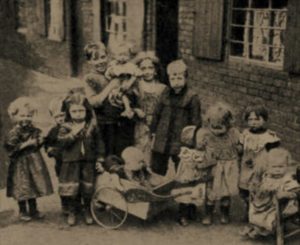
Chainmakers’ Children (1900-1920)
Mary Macarthur, both through her involvement with the Anti-Sweating League and her own organisation, the National Federation of Women Workers (NFWW), had set her mind to helping the country’s poorest paid workers. Describing her first visit to Cradley Heath, she wrote: ‘The red glow of the forge fires and the dim shadows of the chainmakers made me think of some torture chamber of the Middle Ages.’
In 1909, largely thanks to her testimony before the parliamentary Select Committee on Home Work, the Liberal government passed the Trade Boards Act to establish regulatory boards and minimum rates in four low-paid trades: chainmaking, box making, lace making and finishing, and ready-made clothing. The first board established was for the chain trade. The Act did not cover the factory chainmakers, who had been organised into trade unions for some time and were better paid, but only those employed in making ‘hammered and dollied’ chain in small workshops and domestic forges – the type of work carried out mostly by women.
The first meeting of the Chain Trade Board was on 7 January 1910. The board was made up of three appointed members, six workers’ representatives, including Mary Macarthur, and six employers’ representatives, five of whom belonged to the Chain Manufacturers’ Association (CMA), which supported the setting up of the board. However, relations between the employers’ and the workers’ representatives were strained from the start, as the employers were determined that the new rates should not be set so high that profits or business would be lost. Mary Macarthur was exasperated by the hard and unhelpful manner adopted by the CMA, whose members consistently rejected the workers’ proposals as excessive.
In March 1910, the board finally agreed on a minimum wage of 21/2d (1p) an hour to replace the old piecework system. Low as this was, for most women it meant a 100 per cent rise. Their wages had been 4s to 6s (20p to 30p) for a 50 to 58 hour week. The new rates would give them 10s to 11s (50p to 55p) a week for a 55 hour week. The board had fixed new rates which would see women’s earnings double, yet it seemed the Act was destined to fall at the first hurdle.
◄ THE NATIONAL ANTI-SWEATING LEAGUE │ THE ‘WHITE SLAVES’ OF ENGLAND ►